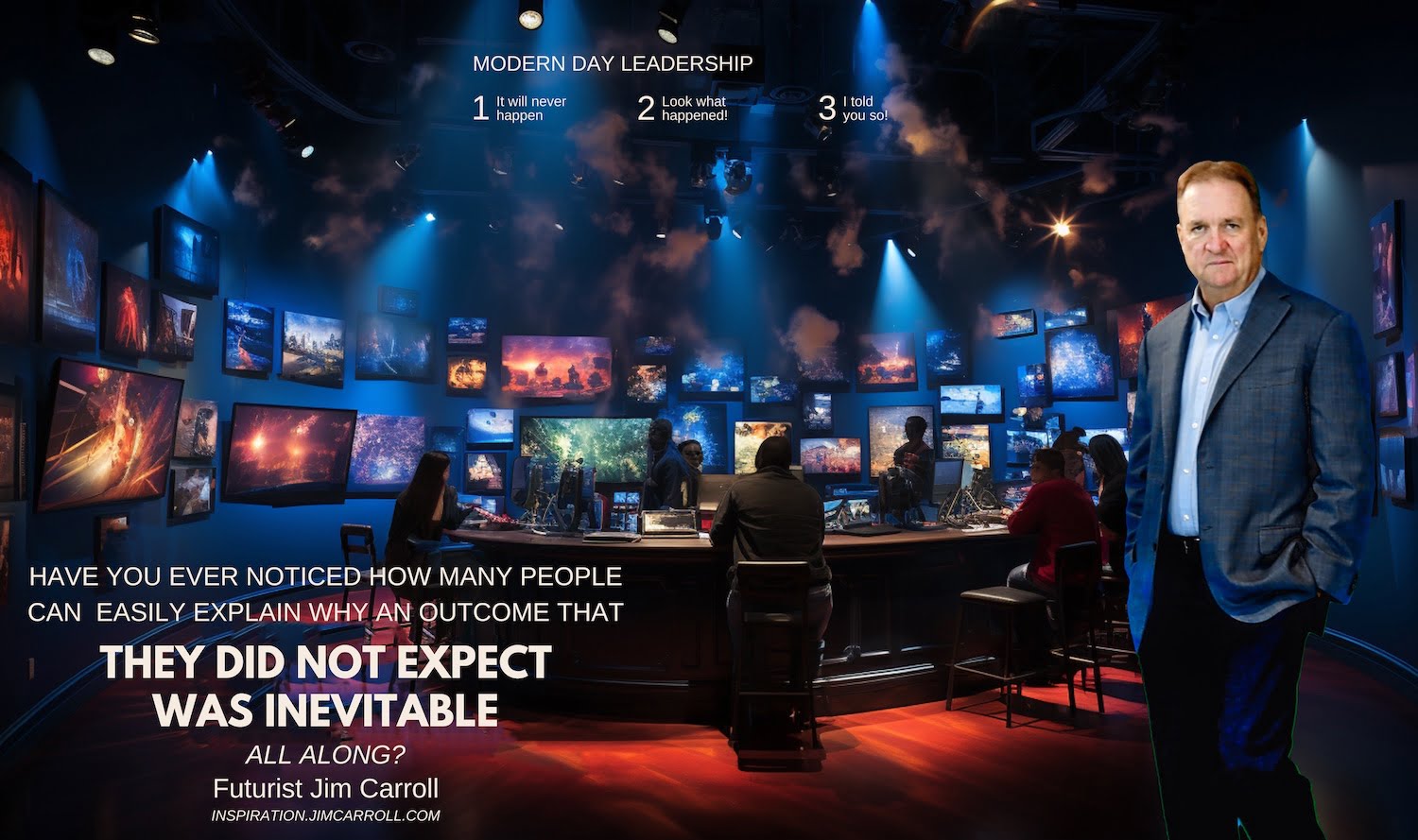“Have you ever noticed how some people can easily explain why an outcome that they did not expect was inevitable all along?” – Futurist Jim Carroll

Today’s Midjourney image prompt: “A room full of experts at nothing, photorealistic, with news headlines on monitors on the wall.”
Seinfeld was ostensibly a show about nothing and yet it seemed to be about everything. Contradictions abound. Today? After things happen, everyone’s an expert, because they express their knowledge of the inevitability of it all! And yet, in fact, people seem to be experts at everything with actual expertise in nothing.
We can probably blame this state of affairs on the media, and in particular, today’s modern-day talk show format. In the rush to get ratings, they’ve engineered an online style that involves bombast, aggression, and anger. I guess to survive in this world, you have to be prepared to toss your principles out the door. I withdrew from participating in media interviews, particularly of the talk show format, after a bizarre appearance on CNBC with Maria Baritoromo in 2006. In a show about innovation, the producers behind the scenes seemed to be eager to get everyone active in yelling at each other. I mean, the show was about innovation! Bizarre.
And yet, this mindset has also become very common in the corporate setting. Many organizations suffer from ‘hindsight bias’ – that is the tendency for people to suggest, after some major event or market shift has occurred, that they knew all along that it would happen. The problem with this is that it leads to a culture where people are unwilling to learn from mistakes – because no one is prepared to acknowledge that a mistake has actually happened!
The fourth-quarter comeback to win the game. The tumor that appeared on a second scan. The guy in accounting who was secretly embezzling company funds. The situation may be different each time, but we hear ourselves say it over and over again: “I knew it all along.”
The problem is that too often we actually didn’t know it all along, we only feel as though we did. The phenomenon, which researchers refer to as “hindsight bias,” is one of the most widely studied decision traps and has been documented in various domains, including medical diagnoses, accounting and auditing decisions, athletic competition, and political strategy.
Association for Psychological Science; ‘I knew it all along…didn’t I?’ – Understanding hindsight bias
26 September 2012, Journal of Engineering
The problem is that the acceleration of hindsight bias In many other companies leads to a culture in which the blame game takes hold – and those who can claim that an unexpected outcome was “inevitable” all along can use that as a weapon to avoid being the one who is blamed! Accountability is avoided, and responsibility is never assigned – leading to an acceleration of more mistakes. This type of corporate culture is toxic, and inevitably, accelerates failure.
The fact is, quarterbacking can be a real problem. I wrote about this quite some time ago when I suggested that most armchair quarterbacks have never played the sport. Usually, those who later suggest the inevitability of something they previously denied are guilty of this reality.

The whole situation can help to undermine trust – with the reality that constant after-the-fact criticism leads to a situation in which people come to believe that if their decisions will always be second-guessed, they will become hesitant to make decisions in the first place!
The interesting thing with this whole state of affairs is that there are actually three different types of mindsets involved:
Roese and Vohs propose that there are three levels of hindsight bias that stack on top of each other, from basic memory processes up to higher-level inference and belief. The first level of hindsight bias, memory distortion, involves misremembering an earlier opinion or judgment (“I said it would happen”). The second level, inevitability, centers on our belief that the event was inevitable (“It had to happen“). And the third level, foreseeability, involves the belief that we personally could have foreseen the event (“I knew it would happen“).
Association for Psychological Science; ‘I knew it all along…didn’t I?’ – Understanding hindsight bias
26 September 2012, Journal of Engineering
Overall, hindsight bias presents a real challenge when ti comes to the future and trends because it encourages people to spend too much time looking back – trying to justify their previous actions – rather than focusing on tomorrow and what comes next.
Hindsight bias can be likened to driving while only looking in the rear vision mirror. An accident is not far away.
Entertainer Cher sang “If I could turn back time”. She can’t. What is done is done.
Hindsight bias refers to the tendency people have to view events as being more predictable than they really are. After the event people often believe they knew the outcome before it happened. They recall their predictions as much stronger than they actually were. This phenomenon has been demonstrated in several different situations, including investment. It is the “I knew it all along” outcome. The problem is that we didn’t know it all along. We just think we did.
In life we can be faced with a situation in which we have to make a choice and we have several different options in front of us. Which road to take can be a difficult decision. We may agonise.
If it turns out the choice we make was not the best one we have a tendency to look back and think that the correct answer was obvious. We berate ourselves. In fact, that’s more often our human psychology rather than the reality of the situation.
We often hold other people accountable in the same way – “why didn’t they see that; it was obvious”. But we judge too harshly.
Beware Irrational Hindsight Bias,
3 November 2009, Timaru Herald
Spend too much time justifying and rationalizing the past and not enough doing the same with the future, and you’ll have an inevitable problem in dealing with the future.




GET IN TOUCH
Jim's Facebook page
You'll find Jim's latest videos on Youtube
Mastodon. What's on Jim's mind? Check his feed!
LinkedIn - reach out to Jim for a professional connection!
Flickr! Get inspired! A massive archive of all of Jim's daily inspirational quotes!
Instagram - the home for Jim's motivational mind!